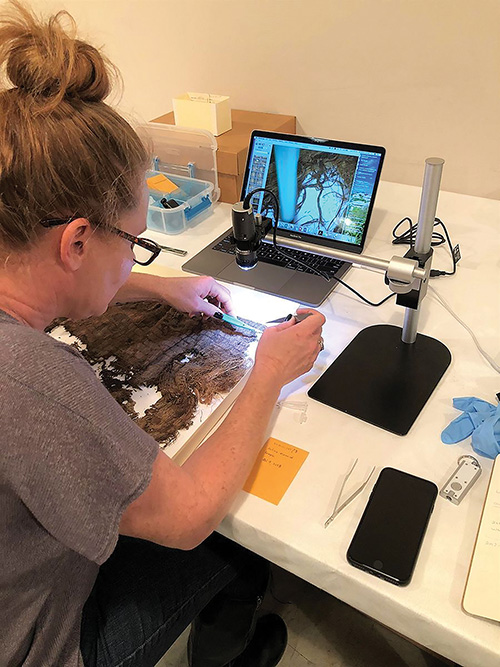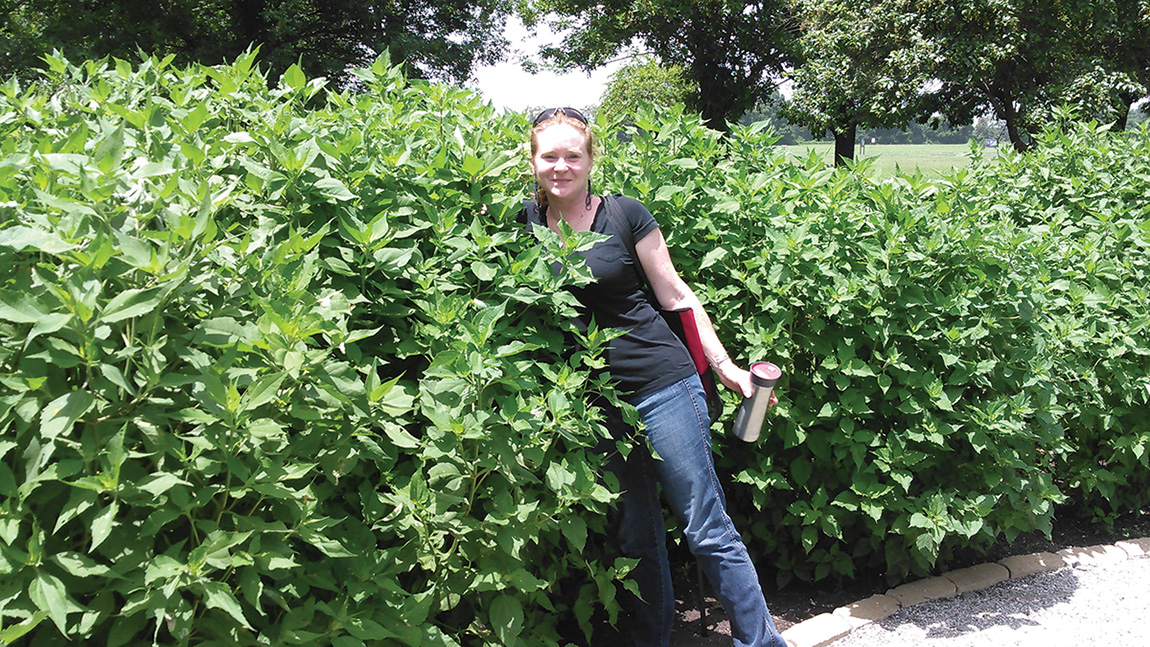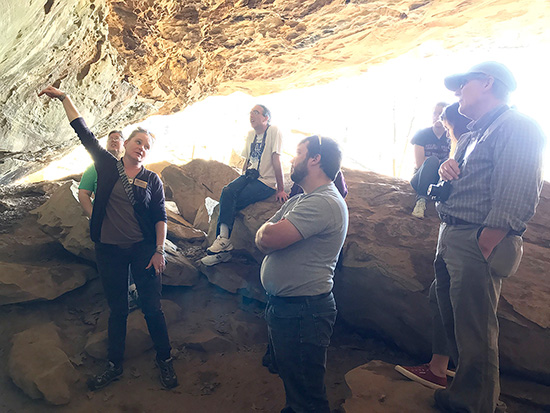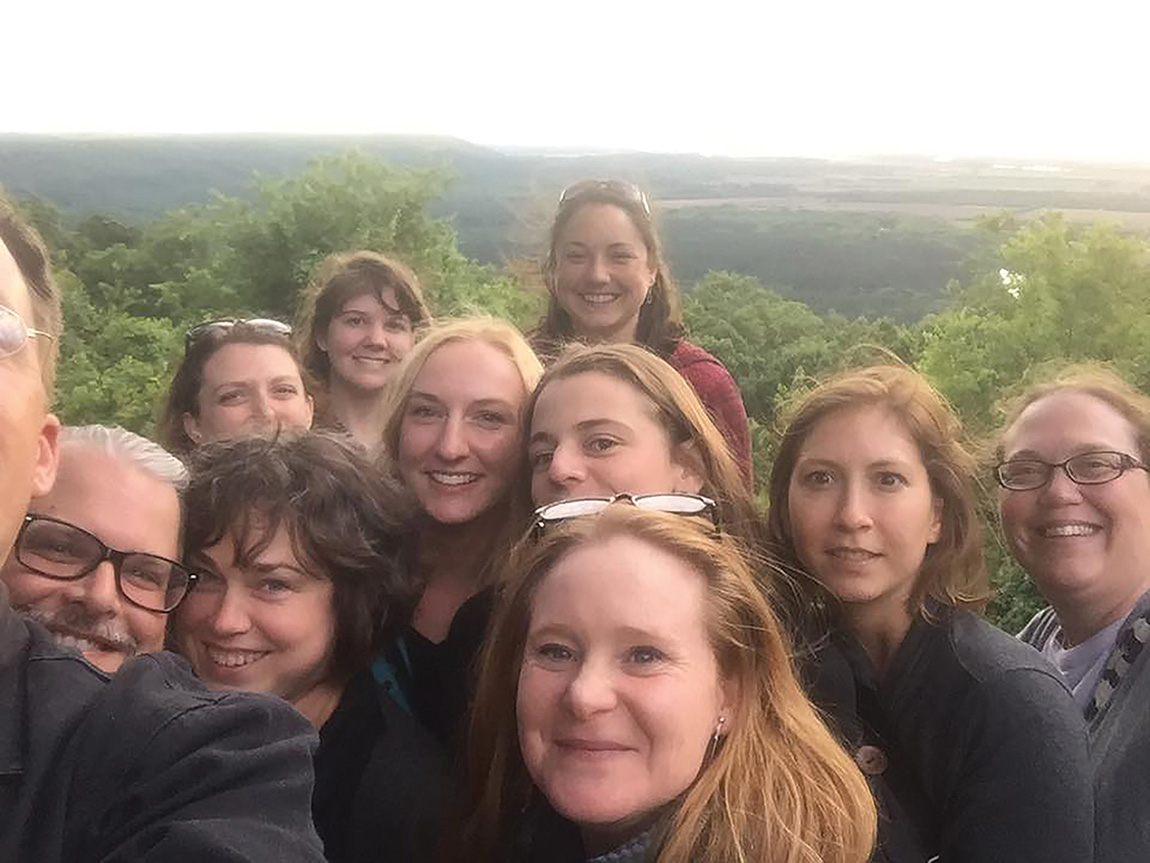On November 2, 2022, the name of Toltec Mounds Archeological State Park was officially changed to Plum Bayou Mounds Archeological State Park and the ARAS research station was renamed the Plum Bayou Research Station. Learn more...
Emily Beahm, Jodi A. Barnes, and Carl G. Drexler
July 29, 2020

The Survey says farewell to Dr. Elizabeth Horton, Station Archeologist at the Toltec Mounds Research Station since 2011, as she moves on to a new stage in her career, developing a paleoethnobotanical and ethnobotanical services company, based out of Charlottesville, VA. Her cutting-edge research, exacting field methods, and clever wit make her a superb archeologist and a wonderful colleague. She will be greatly missed.
Dr. Horton joined the Survey in 2010 as a postdoctoral researcher at the coordinating office, and began the position at the Toltec Mounds Research Station in July 2011. Her research on Pre-Columbian fabric technology and plant fiber use in the Southeast, and Arkansas in particular, shows how women passed down weaving patterns for plant fiber bags and baskets through generations (Figure 1). Using assemblages from the University of Arkansas Museum Collections, she compares the weaving patterns with those of contemporary Southeastern Native weavers to show how weavers still use the patterns today.
Her specialization in paleoethnobotany brought much-needed skills to the Survey. She acquired funding, designed, and cultivated the Plum Bayou Garden at Toltec Mounds Archaeological State Park, which was built with the help of many volunteers including Boy Scouts, students, and Society members. The garden highlights the several thousand-year history of plant domestication, gardening, and farming by Arkansas Indians (Figure 2), and features wild progenitors of ancient Eastern North American crops, modern varieties of crop plants similar to ancient ones, and wild plant resources used intensively for food and technology, like basketry. She set up the Plum Bayou Garden as an active “experimental archeology” garden that aids in studies of the processes of domestication, the identification of the “Type X” grass seed, an unknown species found at Toltec and other mound sites, and aids in the identification of archeological plant remains as comparative collections. Dr. Horton collaborated with other experts in the field as a part of the Lost Crops initiative (lostcrops.org), producing important knowledge about ancient crops (Mueller et al. 2017).


While at the Survey, Dr. Horton has organized and participated in many public outreach endeavors. Her research and enthusiasm for and knowledge of plants contributed to the Survey’s 5th grade social studies curriculum, Gathering, Gardening, and Agriculture: Plant Based Foodways in the Southeastern United States (Figure 3). She worked with the University of Arkansas at Little Rock’s (UALR) Department of Sociology and Anthropology to develop the entertaining, fun, and educational “ArcheOlympics,” hosted by the Toltec Mounds Research Station for several years. Through her relationship with UALR, Horton mentored students interested in southeastern archeology and paleoethnobotanical research. Dr. Horton also taught the Basic Excavation and Paleoethnobotanical Analysis classes at the Society Dig and trained many students (and professionals) to clean trowel and cut laser-straight sidewalls, to process a flotation sample, and to identify plants.
We at the Survey are proud of her work to address sexual harassment in archeology (Meyers et al. 2018). This important research makes the field better for all archeologists. Similarly, through her research, outreach, mentorship, and collaborations, Dr. Horton has made the Arkansas Archeological Survey a better organization (Figure 4).
Dr. Horton intends to continue ethnobotanical and botanical biodiversity surveys, and fabric and fiber analysis. She promises not to be a stranger to Arkansas as she will continue to collaborate with colleagues in the Arkansas Archaeological Survey, Center for Advanced Spatial Technologies, and MicroCT Imaging Consortium for Research and Outreach at the University of Arkansas, Fayetteville and with the Lost Crops network. Liz looks forward to seeing everyone at the AAS annual meetings in the future. We wish her well in her future endeavors.
References
Meyers, Maureen S., Elizabeth T. Horton, Edmond Boudreaux, Stephen B. Carmody, Alice P. Wright, and Victoria G. Dekle
2018 The Context and Consequences of Sexual Harassment in Southeastern Archaeology. Advances in Archaeological Practice 6(4):275–287.
Mueller, Natalie, Gayle J. Fritz, Paul Patton, Stephen Carmody, and Elizabeth T. Horton
2017 Growing the Lost Crops of Eastern North America’s Original Agricultural System. Nature Plants 3:1–5.

